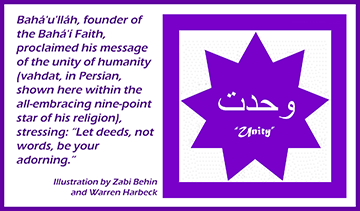Bahá'ís to be identified by their unity-affirming deeds
COFFEE WITH WARREN, with Warren Harbeck
Cochrane Eagle, October 31, 2013

How well members of her religion contribute to the oneness of humanity would be “one great indicator” of how well they practice their faith, says a Cochrane Bahá'í author.
This is my fourth in a series of columns on personal religious symbols and identifiers other than attire and accessories. I’ve focused my attention so far on the four Abrahamic religions: Judaism, Christianity, Islam and Bahá'í.
I began with identifying love as the mark of a Christian. Rabbi Shaul followed up with justice for Judaism, and Muslim author David Liepert spoke of God-conscious servant-righteousness as the identifier for Islam.
But what about the Bahá'í Faith?
For longtime coffee companion Patricia Verge, the answer has everything to do with the oneness of humanity and how a Bahá'í’s life contributes to that oneness.
Pat is the author of two biographies related to her religion: Angus, from the heart: the life of Counsellor Angus Cowan, and (with Evelyn Loft Watts) Return to Tyendinaga: The Story of Jim and Melba Loft, Bahá'í Pioneers.
When I approached her about how a Bahá'í could be identified in a non-material way, she responded as follows:
Thanks for the opportunity to contribute to this discussion. I am happy we have the chance to learn from each faith about its "central operating principle," so to speak.
Of course in this sharing, we aren't trying to reduce the rich and complex revelations given to humanity over the millennia by the Messengers of God to just one word. The teachings brought by Moses, Jesus Christ, Muhammad and Bahá'u'lláh, those Messengers of the Abrahamic lineage, have given rise to immense and complex civilizations that touch all aspects of life.
Bahá'u'lláh, the founder of the Bahá'í Faith, teaches that the fundamental spiritual principle of our age is the oneness of humanity and must be at the heart of any efforts to build a new civilization. I am inspired by words such as these: "Ye are the fruits of one tree, and the leaves of one branch. Deal ye one with another with the utmost love and harmony, with friendliness and fellowship."
The next words of this quote speak about the significance of unity. "So powerful is the light of unity that it can illuminate the whole earth." So how we contribute to unity would be, I believe, one great indicator of how well we practice our faith.
I have learned from the Bahá’í teachings that we have two duties, one inward and one outward, in this earthly life. The first is to transform ourselves spiritually. We struggle to "let each morn be better than its eve and each morrow richer than its yesterday," and to "let deeds, not words,” be our adorning.
Secondly, we are urged to strive for the material and spiritual advancement of society. "Be anxiously concerned with the needs of the age ye live in, and center your deliberations on its exigencies and requirements," are Bahá'u'lláh's words to this effect.
On this last point, Cochrane-area resident Michael Bopp, a community development specialist, has taught me that meaningful development often requires the harmonization of seemingly conflicting individual, cultural and societal interests, if advancement is to occur.
I believe that the apparent tensions among religions, and between science and religion, can be harmonized, too. Opening up this dialogue is a great contribution toward that end.
Thanks, Pat.
So, there you have it, readers: love, justice, God-conscious servant-righteousness, and deeds that promote the oneness of humanity. More than any material adornment, these are to be the meaningful identifiers of followers of these Abrahamic religions.
Next week, a Stoney Nakoda perspective.
© 2013 Warren Harbeck
JoinMe@coffeewithwarren.com